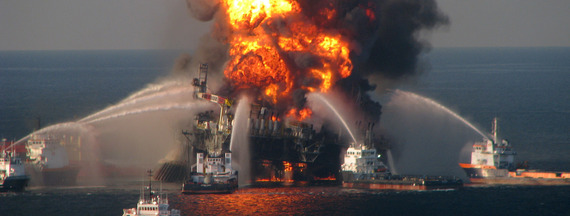The story of the BP Deepwater Horizon is a cautionary tale about the dangers of offshore drilling to people and the environment. It was the nation's worst oil spill and filmmaker Margaret Brown is right to revisit this tragedy in her recently released documentary, The Great Invisible.
The title alludes to the spill's hidden legacy and is a helpful antidote to the nation's collective oil spill amnesia. The film could hardly be more timely as the Obama administration in January proposed opening new areas in the South Atlantic to oil drilling and recently took a preliminary step toward giving Shell Oil a green light to drill for oil in the Chukchi Sea, off the coast of Alaska.
The Great Invisible tells the sad tale of the BP Deepwater Horizon explosion that killed 11 workers in 2010 and, by one government estimate, disgorged 210 million gallons of oil into the Gulf. The film relates the devastating impact of the spill and its ongoing lethal legacy. BP, of course, has mounted an energetic public relations campaign to show how well it has done by the Gulf since the accident, and how clean it now is. But millions of gallons of oil remain in the Gulf, and the Gulf has not fully recovered. Perhaps it never will.
The Great Invisible amply documents the ongoing nightmare that survivors of the BP disaster have endured. It captures the banal suffering and impoverishment left in spill's wake as well as BP's claim that everyone would be made whole financially after the disaster.
That notion is put to rest, however, when we hear from destitute claimants who were unable to jump through BP's bureaucratic hoops. The film also effectively drives home our dependency on oil, especially for transportation, but the documentary has serious shortcomings.
Whereas these are important scenes to get on the record, ultimately, The Great Invisible provides viewers next to no answers to the oil dependency it decries.
The Great Invisible was presented by Participant Media, which has brought us truly exceptional, high-quality documentaries, such as Merchants of Doubt, Good Night, and Good Luck, and An Inconvenient Truth. The Great Invisible, however, falls far short of these marks, and the inherent dramatic potential of its powerful subject is lost.
Participant Media says that it "seeks to entertain audiences first, then to invite them to participate in making a difference," but The Great Invisible leaves the audience feeling depressed, impotent, and guilty, rather than empowered to make change. It does come with a very useful Discussion Guide for classroom use, however, so a good teacher might be able to compensate for this shortcoming.
Whereas freelance environmental documentary filmmaking is hard and generally poorly remunerated work -- often a labor of love and thus commendable -- this film badly needed a good story editor. Its structure and organization are fuzzy, and the slow-paced tale is told without suspense or drama.
Worse, in an effort to share the oil industry's viewpoints, the documentary affords a smug group of wealthy oil industry executives a lengthy opportunity to assert their own indispensability and spout misinformation about renewable energy alternatives, without offering the audience any rejoinder. The case for getting off oil is thus muddied by the film's unanswered fallacies.
Finally, when it comes to describing the ecological impacts of the oil spill on the Gulf ecosystem and to putting the reckless behavior of BP into historical context, the film is wanting and just does not provide viewers adequate scientific insights about the spill or historical perspective on BP.
For contrast, see Greg Palast's hard-hitting, no holds barred oil industry expose Vulture's Picnic, which contains little-known background about an alleged BP oil well blowout in 1992 and its nefarious dealings in Azerbaijan. Other important aspects of, or facts about the BP drama that did not make it into the documentary can be gleaned from some of the references below this review, including, "The Best Writing on the BP Oil Spill," a brief compilation of excellent and readily available journalistic reports about the aftermath and implications of the BP oil spill by Treehugger's Chris Tackett.
John J. Berger, Ph.D. (http://www.johnjberger.com) is an energy and environmental policy specialist who has produced ten books on climate, energy, and natural resource topics. He is the author of the award-winning Climate Peril: The Intelligent Reader's Guide to the Climate Crisis and Climate Myths: The Campaign Against Climate Science.
Follow John J. Berger on Twitter at: www.Twitter.com/johnjberger.
References:
"Oil and Chemical Spills," National Oceanic and Atmospheric Administration (NOAA) http://oceanservice.noaa.gov/hazards/spills/
FAQ, Oil and Chemical Spills, "Office of Response and Remediation, National Oceanic and Atmospheric Administration (NOAA), http://archive.orr.noaa.gov/faq_topic.php?faq_topic_id=1
Lindsay Abrams, "Big Oil's astronomical hand-out: Fossil fuels receive $5.3 trillion in global subsidies each year," Salon, May 18, 2015. http://www.salon.com/topic/fossil_fuels/
Julie Cart, Jack Dolan and Doug Smith, "Santa Barbara oil spill: Pipeline operator has long record of problems," Los Angeles Times, May 20, 2015. http://www.latimes.com/local/california/la-me-oilspill-pipeline-20150521-story.html
Anastasia Pantsios, "Shell Oil Loses Arctic Drilling Lawsuit," Ecowatch, November 13, 2014, http://ecowatch.com/2014/11/13/shell-oil-arctic-drilling-lawsuit/.
Antonia Juhasz, "Meet the Rappers and 'Kayaktivists' Out to Stop Shell's Giant Oil Rig," Rolling Stone, May 22, 2015. http://www.rollingstone.com/politics/news/meet-the-rappers-and-kayaktivists-out-to-stop-shells-giant-oil-rig-20150522
Kerry Sheridan, AFP, "BP oil spill caused dolphins' lung disease, deaths: study,"
May 21, 2015. http://www.businessinsider.com/afp-bp-oil-spill-caused-dolphins-lung-disease-deaths-study-2015-5
Colin Chilcoat, "Shell Approval May Trigger Resource Race In The Arctic," Oil Price Daily, May 22, 2015. http://oilprice.com/Energy/Energy-General/Shell-Approval-May-Trigger-Resource-Race-In-The-Arctic.html
Andrea Juhasz interview with Amy Goodman, "30 Million Gallons Under the Sea: Five Years After BP Disaster, New Drilling OK'd by Spill Site," Democracy Now!, May 14, 2015. http://www.democracynow.org/2015/5/14/30_million_gallons_under_the_sea
On Scene Coordinator Report on Deepwater Horizon Oil Spill (PDF) (Report). September 2011. Retrieved 22 February 2013.
"Deepwater Horizon oil spill," Wikipedia, http://en.wikipedia.org/wiki/Deepwater_Horizon_oil_spill.

